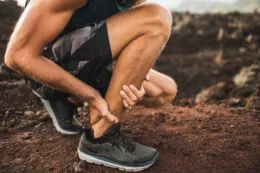Why Do My Calves Hurt After Running?

If you’re an avid runner, you might be familiar with the nagging and sometimes sharp pains that can occur in your calves post-run. Why do my calves hurt after running? The answer isn’t always straightforward, but often it relates to muscle tightness or overuse. Addressing this pain entails more than just a quick fix; it requires a regimen of proper stretching and conditioning.
Understanding Calf Pain After Running
Running is an intensely physical activity, and your calves are central to each stride you take. They work hard, contracting and relaxing, to propel you forward and absorb shock with each step. But why do they end up in pain, and more importantly, what can you do about it?
- Overuse and muscle fatigue are common culprits. When you demand too much from your calves, they can become overworked, resulting in pain from the excess stress and fatigue.
- Poor running technique can be to blame. The way your foot lands and your stride length can place unnecessary strain on your calf muscles.
- The importance of a good stretching routine cannot be overstated. Neglecting to stretch properly can lead to tight, painful calf muscles after your run.
- Don’t underestimate the power of hydration and electrolytes. They are vital for muscle function and preventing cramps that lead to pain.
Given these factors, a physical therapist’s insights can be invaluable. They often recommend dynamic stretches to warm up your muscles before a run and static stretches afterwards to maintain flexibility and prevent tightness. Some beneficial exercises include:
- Dynamic stretches such as leg swings and walking lunges.
- Static stretches like the classic runner’s stretch against a wall or a downward dog pose from yoga.
- Strengthening moves like calf raises can bolster your muscles and make them more resilient to the demands of running.
Incorporate these exercises into a routine, ensuring you target the muscles effectively and help to mitigate the risk of injury.
When In Doubt, Seek Professional Insight
Physical pain is your body’s way of signaling that something is amiss, and it’s crucial to listen. While many instances of calf pain are benign and will resolve with rest and proper care, there are times when professional medical advice is warranted.
- If your calf pain persists or worsens after a few days of self-care, it’s time to consult a doctor to rule out more severe injuries.
- Severe swelling, redness, or warmth in the calves can be a sign of deep vein thrombosis, a potentially life-threatening condition that requires immediate attention.
- Difficulty walking or bearing weight on the affected leg could indicate a strain or tear in the muscles or tendons.
- Numbness or tingling may suggest nerve involvement, demanding prompt evaluation.
- And finally, if your calf pain comes with systemic symptoms like a fever or unexplained weight loss, seek medical attention, as these could signify an infection or another underlying health issue.
Related
Avoiding Common Treadmill Mistakes: Tips for Injury Prevention
Other Treadmill Reviews:
- Test HomePage
- NordicTrack Commercial X14i
- Echelon Stride
- NordicTrack C 590 Pro
- NordicTrack T 7.5 S - Pros & Cons (2024)
- Sole TD80 Treadmill Desk
- NordicTrack Commercial X11i
- NordicTrack T 8.5 S - Pros & Cons (2024)
- Horizon Elite T5
- Exerpeutic TF1000
- NordicTrack T 6.5 S - Pros & Cons (2024)
- ProForm Sport 5.0
- ProForm Premier 900
- ProForm ZT6
- NordicTrack FreeStride Trainer FS5i (Discontinued)
- Bowflex Max Trainer M5
- BowFlex TreadClimber TC100
- ProForm Power 795
- ProForm Sport 7.0
- NordicTrack Incline Trainer X15i
- NordicTrack C 1650 Treadmill
- Horizon Elite T9
- Official Boston Marathon Treadmill 4.0
- NordicTrack Treadmill Desk
- NordicTrack C 1630 Pro
- NordicTrack C 970 PRO
- Bowflex TC20 TreadClimber

